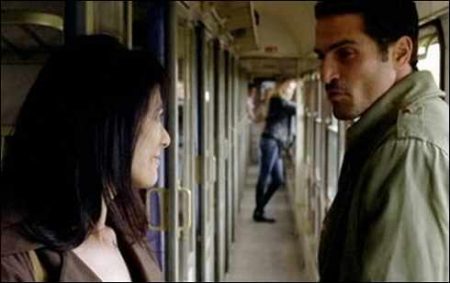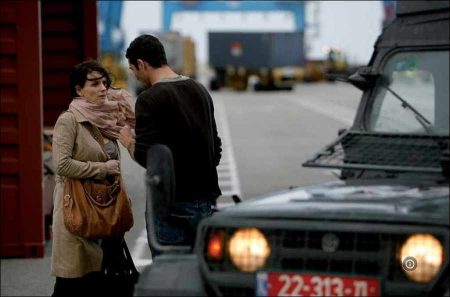Disengagement tells a story in two parts and two places. In 2005 in Avignon, a man has died; at his house his body lies in state attended by a soprano and by his daughter Ana, who is in the process of leaving her husband. His adopted son Uli, an Israeli police officer, arrives for the funeral.
With Uli, Ana is playful, even foolish, and she attempts to forge a new will of her father’s. The family attorney brushes aside her forgery and produces a true will that upsets Ana and sends her, with Uli, to Israel where she must visit a settlement scheduled for destruction in the Gaza disengagement. What are the wellsprings of emotion, and what of an embrace?
Disengagement (Désengagement) is a film directed by Amos Gitai, starring Juliette Binoche, with Jeanne Moreau in a supporting role. The film is a French/Italian/Israeli co-production, and was shot in France, Germany and Israel. It is the third film of Gitai’s “Border” or “Frontier” trilogy. The film premiered at the 2007 Venice Film Festival in an out-of-competition slot. Following this the picture played at the 2007 Toronto International Film Festival.

Film Review for Disengagement<-/h4>
Individual questions of belonging and reconciliation resonate with contentious geopolitical ones in the new film by Amos Gitai, a story that prefers to draw connections obliquely and without rendering direct judgment. Challenging at times but ultimately affecting, it should find viewers receptive at the more rarefied end of the arthouse marketplace.
Juliette Binoche plays Ana, an odd bird whose jarring sense of humor — weird vocal tics, overly sexual flirtation with her half-brother Uli — may or may not be a temporary side-effect of grief. Her father is dead, lying in repose within the dilapidated luxury of an Avignon estate that (to judge from a nearly surreal one-off scene) appears to have a village of squatters lurking quietly in the basement.
Gitai dallies in this limbo, placing the recently reunited siblings in some meandering rebonding scenes before the postfuneral revelation: For years, Ana’s father knew about the daughter she had in secret and abandoned on a kibbutz. His will requires Ana to go to the Gaza Strip and introduce herself to Dana, now a schoolteacher in an Israeli settlement.
Coincidentally, Uli’s police unit has been tasked with disbanding those settlements, and the story’s second half, more dramatically driven but still moving at its own pace, follows brother and sister on their separate missions into this emotionally and politically charged territory.
The characters transform when freed from their father’s home, Ana becoming an accidental witness to history (Binoche looks more at home here, raw and apprehensively wide-eyed) and Uli a cautious participant in it, trying to avert disaster while doing his duty. The closer we get to the removal of settlers, the more Gitai’s pacing choices make sense:
Extra moments spent along a line of police practicing crowd control here or the slow crawl through a temple full of desperate settlers there convey the gravity of the conflict better than dialogue would, and offer stronger emotional shading to the mother/daughter reunion taking place at the same time. Gitai doesn’t reveal just where that relationship is going to go, any more than he predicts the next phase in Israel/Palestine relations; clearly, this moment of interaction is the important thing to witness.
A wryly sexy prologue to the film offers two strangers on a train, each a mixed bag of ethnic and political identities, sharing a cigarette despite a customs official’s insulting suggestion that their countrymen wouldn’t approve. There’s no symbolism here, one replies, right before the Israeli and the Palestinian fall into a torrid embrace. The delivery of the line sounds like a facetious disclaimer on the filmmaker’s part, daring viewers to make sense in dramatic terms of relationships that are still being negotiated in the real world.
Disengagement
Disengagement (2001)
Directed by: Amos Gitai
Starring: Juliette Binoche, Liron Levo, Dana Ivgy, Jeanne Moreau, Barbara Hendricks, Hiam Abbass, Tomer Russo, Israel Katorza, Amos Gitai, Uri Klauzner, Yussuf Abu-Warda, Roni Weissman
Screenplay by: Amos Gitai, Marie-Jose Sanselme
Production Design by: Emmanuel de Chauvigny, Tim Pannen, Eli Zion
Cinematography by: Christian Berger
Film Editing by: Isabelle Ingold
Costume Design by: Moira Douguet
Art Direction by: Willy Margery, Tim Pannen, Hervé Simon
Music by: Simon Stockhausen
MPAA Rating: None.
Distributed by: IFC Films (United States), Ad Vitam Distribution
(France)
Release Date: January 5, 2008
Views: 54



